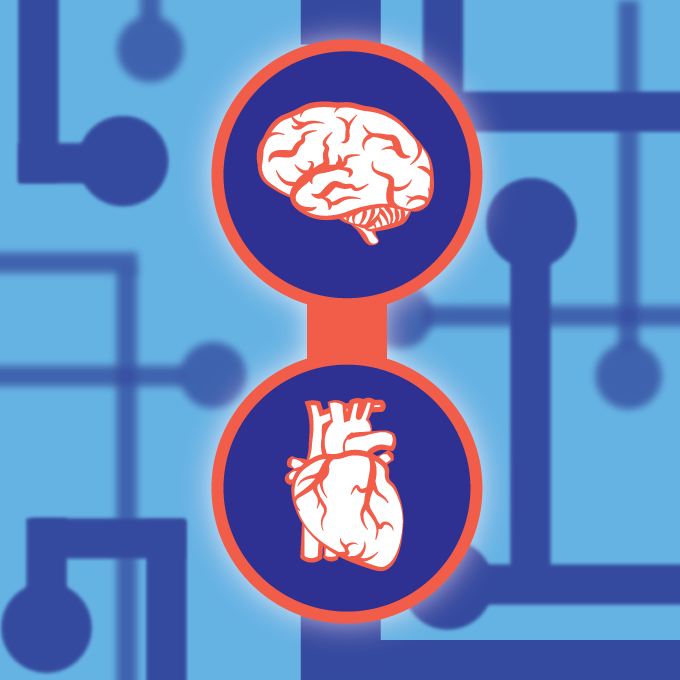
Caption: Findings from two studies by University of Pittsburgh School of Medicine researchers suggest that what’s good for your heart is good for your brain. Illustration by Phoebe Ingraham Renda
Over time, negative health factors, like high blood pressure, stress and inflammation, add up—raising your chances of developing cardiovascular disease and, as new research suggests, experiencing cognitive decline.
 “Studying the heart-brain axis is about understanding if cardiovascular disease is a window into the future of how the brain will be,” says Anum Saeed, assistant professor of medicine and the primary author of two new studies in eBioMedicine and in the Journal of Alzheimer’s Disease Reports. In both studies, Saeed and colleagues reveal resilience factors that may help reduce cardiovascular disease risk and the cognitive importance of heart health as you age.
“Studying the heart-brain axis is about understanding if cardiovascular disease is a window into the future of how the brain will be,” says Anum Saeed, assistant professor of medicine and the primary author of two new studies in eBioMedicine and in the Journal of Alzheimer’s Disease Reports. In both studies, Saeed and colleagues reveal resilience factors that may help reduce cardiovascular disease risk and the cognitive importance of heart health as you age.
Blood Metabolites Predict Heart Health
Metabolites are molecules in the body that come from food, medicine or natural biological processes. They are the downstream effects of your genetics and environment and detail your body’s response to genetic-environmental interactions.
“Metabolites are very telling,” says Saeed. “You're getting a snapshot of what processes are happening and it gives you a picture of what is happening in the body—apart from what we can see clinically.”
Some metabolites are detrimental to heart health, but others, Saeed notes, can be protective and may keep cardiovascular disease at bay. However, their protective effects in the long term were unknown.
Analyzing blood samples taken over 20 years from patients in the Heart Strategies Concentrating on Risk Evaluation (Heart SCORE) study cohort, Saeed and her team saw how blood metabolites changed with age. These lifelong snapshots allowed the team to identify metabolites that strongly predict heart disease risk later in life.
The analysis revealed that the presence of two metabolites, alpha-ketobutyrate and phosphatidylinositol, in midlife (50 – 64 years) was linked with fewer occurrences of cardiovascular disease in late life (65+ years). Both metabolites carry out anti-inflammatory functions, and their presence may be influenced by genetics and environmental factors—like diet. Additionally, the results suggest that plasmalogen metabolites, which are important for brain health, may also lower the risk of heart disease.
Heart Disease Risk May Forecast Brain Health
 Clinicians commonly use atherosclerotic cardiovascular disease (ASCVD) risk scores to calculate a patient’s 10-year risk of experiencing a cardiovascular event, like a heart attack or stroke. Calculated by combining health factors, including age, cholesterol levels, blood pressure and smoking status, these scores guide clinical recommendations for preventive measures, like lifestyle modifications or medication.
Clinicians commonly use atherosclerotic cardiovascular disease (ASCVD) risk scores to calculate a patient’s 10-year risk of experiencing a cardiovascular event, like a heart attack or stroke. Calculated by combining health factors, including age, cholesterol levels, blood pressure and smoking status, these scores guide clinical recommendations for preventive measures, like lifestyle modifications or medication.
Several of these mid-life ASCVD risk factors, like high blood pressure, diabetes, smoking and obesity, are also associated with cognitive decline in late life.
“There are risk and resilience factors that make people at higher or lower risk,” says Ann Cohen, coauthor and associate professor of psychiatry, School of Medicine. “I think cardiovascular disease will be one of the most important factors to understand. These studies highlight the importance of taking a lifespan approach to understanding brain aging.”
Study results showed that a high 10-year risk for ASCVD was linked to early signs of brain aging, like the appearance of white matter hyperintensities (areas of increased signal intensity) on brain images. These findings suggest that poor heart health might make the brain more vulnerable to dementia or Alzheimer’s disease later in life.
“What this means is that when we—as clinicians, primary care physicians and cardiologists—see patients with high ASCVD risk, we should be prompted to help patients understand and control these risk factors throughout aging,” says Saeed.
